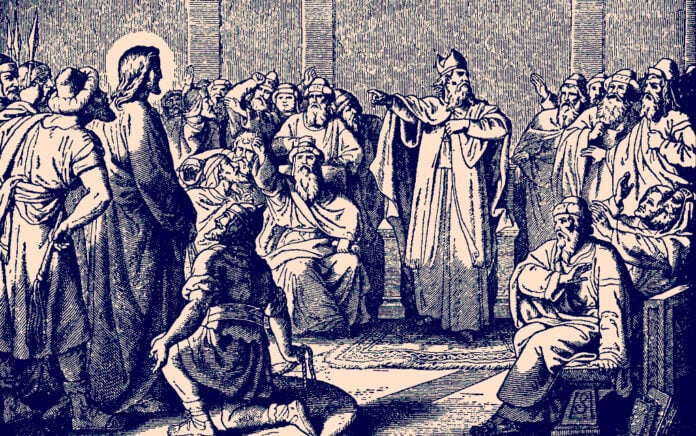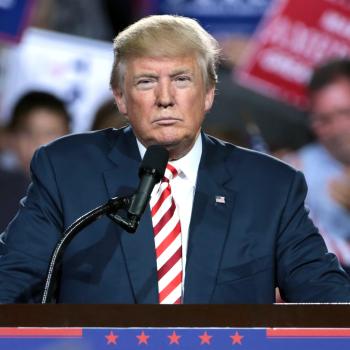
Choosing Barabbas
I’ve been intermittently listening to Bach’s Matthäuspassion performed by the Tölz Boys’ Choir over the last week. (You can watch it here.) It’s a sweeping and highly emotional oratorio, narrating the passion events of Matthew 26 and 27 from Martin Luther’s translation of the New Testament, along with theological and devotional commentary in the form of solos. As I listened and read along, I was struck by one section during the public trial of Jesus. In German, it’s rendered “Aber die Hohenpriester und die Ältesten überredeten das Volk”— “But the high priests and the elders had persuaded the people…” Persuaded. Such a charged word in the story. The crowd’s persuasion immediately escalates into a virulent demand. The chorus cries out in a single minor chord, “Barabbas!” The horror of the word lingers as the tones reverberate off the walls and ceilings of the Brixen cathedral.
Fear of Gang Violence
If you’ve been following the news recently, you’ve no doubt been troubled by the case of Kilmar Ábrego García, a man who was wrongly deported to his home country, El Salvador, and imprisoned in a maximum-security facility known for its brutal treatment of prisoners. Ábrego García had fled El Salvador for the US in 2011 for fear of gang violence against him and his family. Although he entered the country illegally, he had been granted protection in 2019 by the court due to the ongoing threat that the gang Barrio 18 posed to his safety. Since that hearing, Ábrego García lived in Maryland with his wife and three children with little issue until he was detained by ICE on March 12 of this year. He was deported three days later and sent to the Terrorism Confinement Center in El Salvador.
Homegrowns Are Next
The Trump administration has admitted on record that his deportation was an “administrative error,” but the president has ignored a district ruling, upheld by the Supreme Court, that the administration facilitate Ábrego García’s return. At a meeting with El Salvador president Nayib Bukele in the Oval Office on Monday, both the US president and the Salvadoran president doubled down on the deportation order. Bukele said he would not “smuggle a terrorist into the United States,” claiming without clear evidence—in contradiction to much evidence—that Ábrego García was a danger to the public. What’s more, Trump suggested in that Oval Office meeting with Bukele that his administration would like to deport US citizens to Bukele’s Salvadoran prison, saying “the homegrowns are next.”
Stop Playing Political Games
Just this Thursday, Ábrego García’s wife, Jennifer Vasquez Sura, publicly criticized her husband’s disappearance as a miscarriage of justice. “Kilmar has always been a loving partner and father, and I will continue to stand by him and demand justice for him.” She went on to say, “As we continue through Holy Week, my heart aches for my husband, who should have been here leading our Easter prayers. Instead, I find myself pleading with the Trump administration and the Bukele administration to stop playing political games with the life of Kilmar.”
Many to Suffer
Ábrego García’s plight is not the first immigration power play in the new Trump administration. In fact, it’s the latest and most egregious (so far) in a rising tide of spurious detentions, revocations, and deportations. Just last month, Mahmoud Khalil, a Palestinian graduate of Columbia University who was a permanent resident of the US, was arrested and sent to Louisiana after authorities discovered he had participated in protests against the war in Gaza. A few weeks ago, Rümeysa Öztürk, a Turkish student studying at Tufts University, was arrested and placed in an immigration detention facility in Louisiana after she co-authored an op-ed in her school newspaper in which she criticized the university administration on issues related to the war. Although neither Khalil nor Öztürk has been accused of any crime, they have become two of many to suffer under the administration’s crackdown against pro-Palestinian protests at universities.
Over the last week, the US government has revoked the legal status of over a thousand students across college campuses without a clear reason. Three students at my own doctoral alma mater, Baylor University, had their visas revoked with no cause. These students were not protestors; they weren’t convicted of any crime. They are students in good standing.
The high priests and elders had persuaded the people.
They persuaded the people. I’m struck by John Calvin’s commentary on Pilate’s trial in his harmony of the Gospels. He takes the sham trial as a moral lesson, drawing allusions between the way Pilate and the chief priests treated Christ, and the way that Protestants had faced persecution from the state. He focuses on how easily the crowds can be moved by the attention and influence of wicked leaders.
“The Evangelist points out the chief instigators of the wicked proceedings; not that the foolish credulity of the people, who were influenced by others, admits of any excuse; but for the purpose of informing us that they were not, of their own accord, hostile to Christ, but that, having sold themselves to gratify the priests, they forget all justice and modesty, as well as their own salvation. Hence we learn how pernicious is the influence of wicked men, who can easily turn in every direction, to all kind of wickedness, the giddy and changeful multitude.”
Calvin continues, writing that the point the Gospel writers make in this passage is not to highlight the express hatred of the crowds, but rather to show that they can be made to hate the innocent out of a desire to follow their leaders’ bidding.
“Yet we must attend to the design of the Evangelist, which was to show, that the death of Christ was so eagerly demanded by the voice of the people, not because he was universally hated, but because the greater part of them, ambitiously desirous to follow the inclination of their rulers, threw aside all regard to justice, and might be said to have sold and enslaved their tongue to the wicked conspiracy of a few.”
In his commentary on the Gospel of John, Calvin homes in on the rhetorical obfuscation offered by the religious leaders to Pilate: “If he were not a criminal, we would not have handed him over to you.” Too often, Calvin claims, evil authorities hide behind the integrity of their position.
“Such is the manner in which wicked men, whom God has raised to a high degree of honor, blinded as it were by their own greatness, allow themselves to do whatever they choose. Such, too, is the intoxicating nature of pride. They wish that Christ should be reckoned a malefactor, and for no other reason but because they accuse him.”
He goes on to state in his commentary on the synoptics that even Pilate’s attempt to compromise with the crowd evinces injustice. When Pilate offers to scourge Jesus, he too commits a lesser crime because he has already declared Jesus’s innocence. But the people’s fury will not be sated by a minor punishment. Why do the people go along with the leaders’ condemnation of Jesus? According to Calvin, it’s not that the people hated Jesus, but their desires were so tied to the whims and caprice of those in power that they abandoned the innocent and became slaves to the conspiracies of the guilty.
Kangaroo Courts
We are seeing something similar play out in real time in our midst. I don’t mean that Kilmar Ábrego García is a messianic figure. But I do mean that Ábrego García and countless others are the victims of what Calvin calls a people who “sold themselves to gratify the priests,” forgetting “all modesty and justice.” As it stands, we can’t know what kind of man Kilmar Ábrego García is, whether good or evil. We have been denied that knowledge because, out of a fearful impulse to self-preservation, we have sold the rights to due process that all persons living in the US are entitled to in exchange for the kangaroo courts of the current executive branch. We have forgotten all modesty and justice. The presumption of innocence that guides our legal structures will continue to be trampled down under the feet of the throng of the “mandate” for swift change. “‘If he were not a criminal,’ they replied, ‘we would not have handed him over to you’” (John 18:30).
Brandishing Cruelty as a Weapon
What the Trump campaign promised was not just stricter border control or sweeping immigration reform. Donald Trump promised to prioritize retribution against immigrants, to brandish cruelty as a weapon, to dehumanize and degrade people coming into the US from other nations. The electorate bought into the plan, assuming whatever Trump was offering was necessary. Things needed to be “shaken up in Washington.” Republicans in Congress have abrogated their duty to check the executive branch, unwilling to face the wrath of their MAGA constituents and their chosen leader. We choose Barabbas again and again not because we think he’s good, but because we think the choice will protect us—our way of life, our wealth, the integrity of our nation, our global standing.
Steered Toward Fear by Those in Power
I’m compelled by Calvin’s commentary because he gets at the normalcy of it all. The situation that Jesus, Pilate, the religious leaders, and the crowds find themselves in does not strike Calvin as a unique occurrence (although its cosmic significance is unique). The suffering of the innocent at the hands of the mighty is not strange to him. Rather, Calvin says, This is what the powerful do to people. When Calvin read the passion narratives, he was rightly suspicious of the way the masses could be directed by shrewd political maneuvering and bald displays of force. When the crowds chose Barabbas over Jesus, they didn’t know what they were asking for. They were steered toward fear by those in power. They handed over their consciences, blindly trusting in the intentions and the assertions of those who directed them. When the chips were down, when the temperature was raised, the thief the people knew became more acceptable, more plausible, more benign than the accused they didn’t know. A scapegoat, they thought, would serve their interests better than a just outcome. Are we so much more perceptive than them?

















